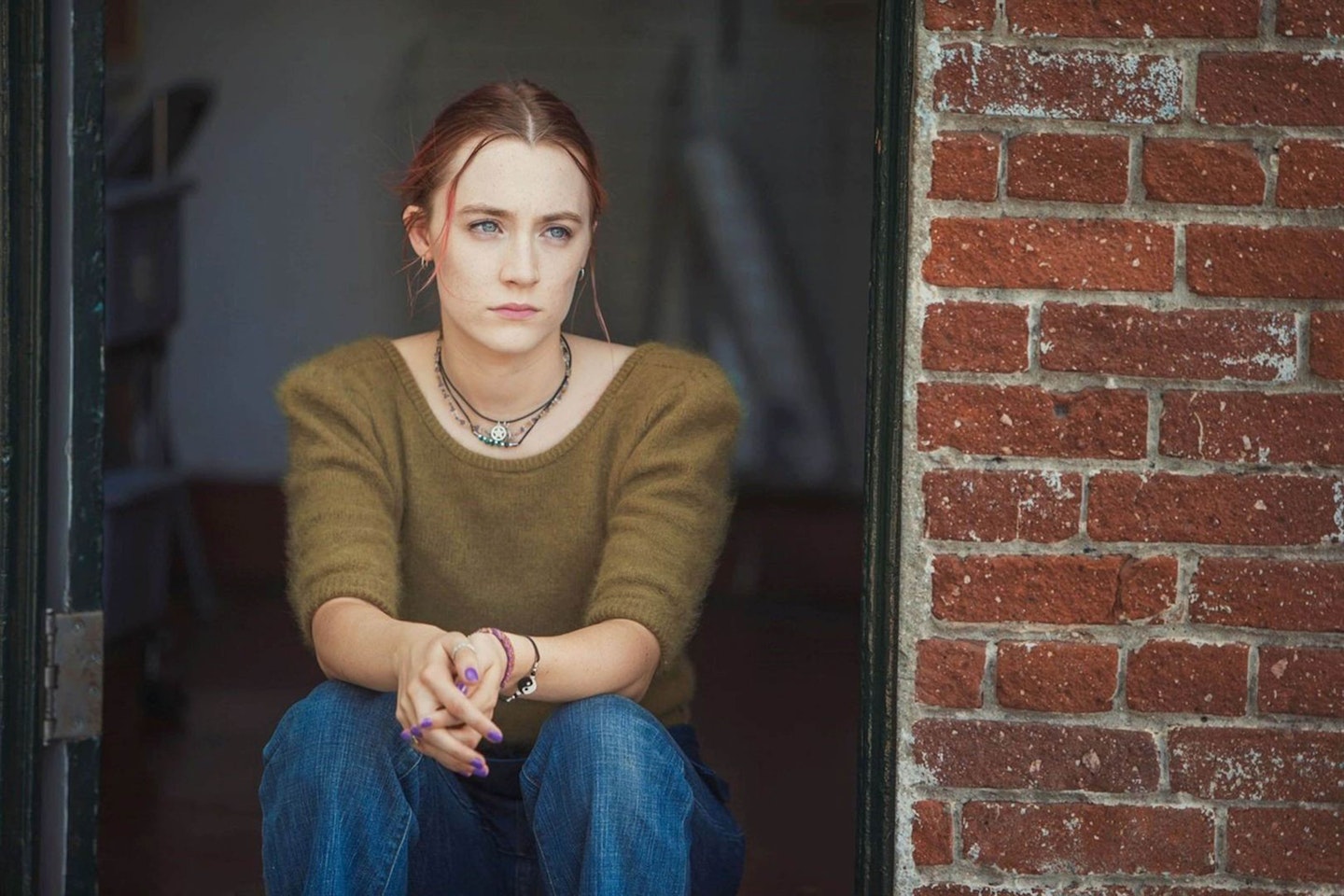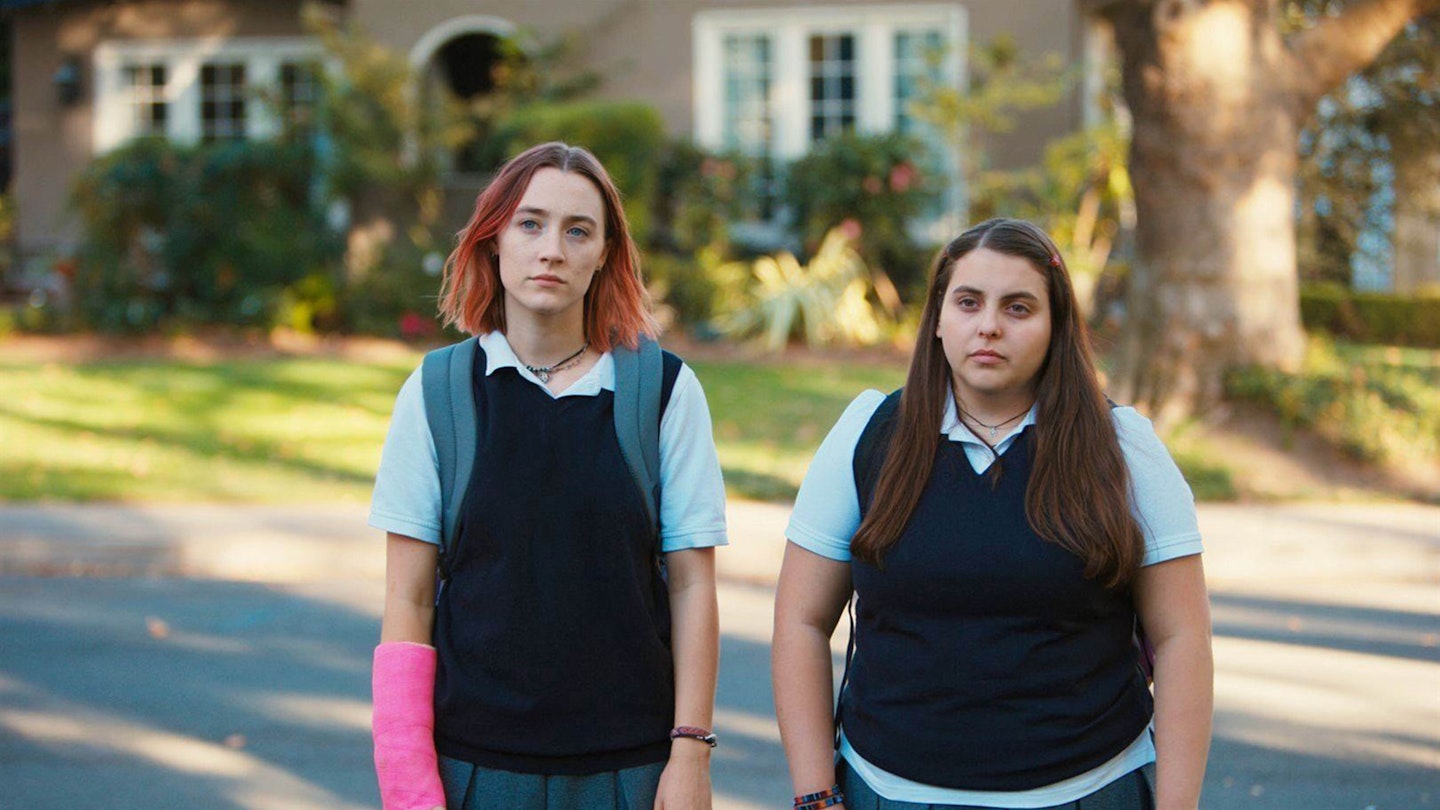There’s a little refrain that runs through Greta Gerwig’s Lady Bird, and it’s about a tanning bed. Our heroine, who calls herself Lady Bird (it never quite sticks, as self-imposed nicknames so often fail to do), is obsessed with Jenna Walton, a high school princess whose J-17 looks generate their own mythology. ‘I heard she has a tanning bed,’ Lady Bird’s best friend, the resolutely uncool Julie, whispers in what’s surely a deliberate echo of that infamous ‘I heard her hair is insured for $10,000’ line from Mean Girls.
Fast-forward a while and Lady Bird (Saoirse Ronan) has elbowed her way into Jenna’s inner circle – and, crucially, onto the guest list for her house party. Cry Me A River is playing, because it’s 2002, and she’s finally kissing Kyle (Timothée Chalamet), who’s just about the coolest boy in school (he plays bass in a band, he speaks in conspiracy theories and he looks like Timothee Chalamet) As they career through a door into another room like couples only manage in movies – lo and behold – here’s the infamous tanning bed! ‘Oh my God! It’s the tanning bed! Julie will love this,’ she crows, much to Kyle’s studied indifference. Here we are at her great moment of romantic triumph, and still she’s banging on about the tanning bed.
I don’t just love this throwaway remark because it’s precisely the kind of socially awkward, tan-fixated comment that might’ve punctuated my own adolescence, although it certainly is. I love it because it encapsulates just how generous this film is to teenage experience and, specifically, to female teenage experience. We’ve all seen moments like this on screen before, but this particular kiss scene isn’t just about the kiss. It pivots at the last minute, becoming a celebration of Julie, their friendship and their in-jokes all at the same time: it’s the ties between two best friends that get the last word (Kyle’s response of ‘Who’s Julie?’ says all you need to know about him). For an 18-year-old, these small moments aren’t small, and they don’t always stand for just one thing: sometimes they’re cinematic, and in Lady Bird, the minutiae of a girl’s experience are treated as just that.

Lady Bird is a coming-of-age film that ticks off the senior year milestones that we’ve seen from Pretty In Pink to Mean Girls, even High School Musical – the school play, the overblown crushes, the academic struggles, all leading up to the crescendo of prom then the plunge into the uncertainty of college. Despite this, it never feels formulaic because, just like with the tanning bed kiss, these moments we know so well are both familiar and sharply specific all at once. As an idealistic teen dreaming of college ‘where culture is, in New York, or at least in Connecticut… where writers live in the woods,’ she’s a recognisable type, but one drawn with her own charming, irritating foibles: her insistence on her nickname, her love of Dave Matthews Band’s Crash Into Me, her complicated relationship with her mother (Laurie Metcalf) and her unwavering sense of self-worth.
While films about boys growing into men often become critical darlings, young women tend to get short shrift, in reviews by (overwhelmingly male) critics and on screen. For every Fish Tank, Clueless, The Diary of a Teenage Girl or even Bend It Like Beckham, there are tens of films that receive little to no fanfare. Last year’s Edge of Seventeen starring Hailee Steinfeld, for example, was touted as an early awards season contender but barely registered at the box office. Worse still, there are yet more films that treat their teenage female protagonists – and by extension, their viewers – with barely disguised distain, churning out identikit mini-heroines whose personalities might fit into one of about three types (and can boast only two out of three dimensions). If pop culture shapes our world view even a little, it’s no wonder that teenage girls are often under-estimated by others and by themselves.
In part, Lady Bird is Greta Gerwig’s response to this double standard. Here, we have a character who’s acutely aware of her own potential, pursuing a college place on the East Coast as doggedly as she chases a role in the school musical; who isn’t ashamed of having sex but isn’t defined by it either. Sometimes we laugh at her, but we still take her seriously. Her entanglements with Kyle, and with Lucas Hedges’ nice guy Danny are comic veins tapped again and again, but just as in the films that Gerwig has co-written with Noah Baumbach (Frances Ha and Mistress America) platonic love is equally important: it’s her relationships with other women – her mother, her best friend – that shape both Lady Bird the character and Lady Bird the film.
That women can have rich interior lives at any age shouldn’t be a radical proposition – it’s 2018, after all – and yet it says a lot about the film industry that Lady Bird has been hailed as such. Greta Gerwig is just the fifth woman to receive a directing nomination in 90 years of the Oscars; so far only one woman, Kathryn Bigelow, has won, for Iraq drama *The Hurt Locker *(it's telling that it took a war movie for the Academy to take a female director seriously). Watch Lady Bird and you’ll see how striking the difference is when a woman calls the shots on how the watershed moments of a girl’s life are presented on screen. ‘What is Boyhood, but for a girl? What is The 400 Blows but for a girl? What is personhood for young women?’ Greta Gerwig asked at a New York screening of her film last year. In Lady Bird, there are plenty of answers to these questions: maybe messy, sometimes hilarious but always valuable.
Lady Bird is out now in cinemas nationwide.
This article originally appeared on The Debrief.
